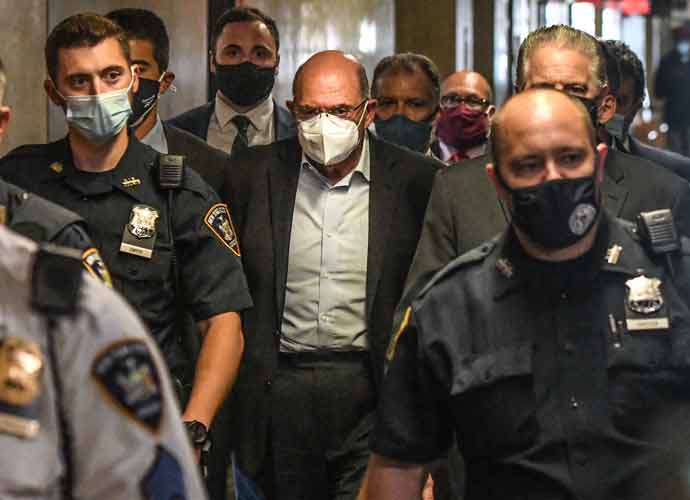Ex-Trump Organization CFO Allen Weisselberg Pleads Guilty To Lying Under Oath During Trump’s Fraud Trial, Faces 5 Months In Jail
Ex-Trump Organization CFO Allen Weisselberg pleaded guilty to committing perjury during his testimony in Donald Trump‘s New York civil fraud trial.
In early February, Weisselberg was reportedly in talks to plead guilty to perjury in his civil fraud case in October 2023 regarding Trump’s financial statements.
In his testimony, the ex-CFO could not offer clear information about Trump’s finances, often saying that he did not remember. While on the stand, he was asked why the former president’s triplex was listed as three times its actual size. He claimed he “never even thought about the apartment,” and that was in his mind.
In late January, a published report in Forbes showed that he talked in detail about these issues with a reporter.
He was not expected to testify against Trump if he took the plea deal and said the deal was also not expected to require him to turn against the former president.
On March 4, Weisselberg pleaded guilty in state court in Manhattan to two counts of perjury and will be sentenced in April to five months in jail.
He admitted lying under oath on three occasions while testifying in the civil fraud case. In addition to his testimony in October 2023, he lied during deposition testimonies in July 2020 and May 2023.
He confessed that he lied when testifying that he lacked knowledge or awareness of how Trump’s Manhattan penthouse was valued on his financial statements at almost three times its actual size.
“You knew that testimony was false,” Judge Laurie Petersen asked Weisselberg.
“Yes,” he responded.
Trump’s Manhattan penthouse was valued on his financial statements from at least 2012 to 2016 as though it measured 30,000 square feet.
Kevin Sneddon, a former managing director of the former president’s real estate brokerage arm, testified that Weisselberg gave the larger figure.
He remembered Weisselberg asking him in 2012 to measure the triplex’s value.
“It’s quite large,” Sneddon told him. “I think it’s around 30,000 square feet.”
Despite this, Weisselberg received an email in early 2012 with an attachment including a 1994 document pegging Trump’s apartment at 10,996 square feet.
The former CFO testified that he remembered the email, but not the attachment, and that he did not “walk around knowing the size” of the apartment.
After Forbes magazine published an article in 2017 disputing the size of Trump’s penthouse, its estimated value decreased from $327 million to about $117 million on the former president’s financial statement.
Prosecutors vowed not to charge him for other crimes he may have committed in connection with his employment at the Trump Organization.
However, in order to avoid violating his probation in the tax case, Weisselberg agreed to plead guilty only to charges relating to his 2020 testimony.
“Allen Weisselberg looks forward to putting this situation behind him,” his lawyer Seth Rosenberg shared in a statement.
Trump’s lawyers argued that Weisselberg did nothing wrong and was targeted by Bragg “in a tyrannical attempt” to impede their client’s presidential campaign.
Weisselberg is going to be formally sentenced on April 10.
In agreeing to a five-month sentence, prosecutors cited his age and willingness to confess wrongdoing.
Perjury is a felony punishable by up to seven years in prison in New York.
Judge Arthur Engoron, the judge in the civil fraud case, ruled last month that Trump, Weisselberg and others schemed to deceive banks, insurers and others by lying about Trump’s wealth on financial statements used to make deals and secure loans.
In addition to penalizing Trump $354.8 million, along with almost $100 million in pre-judgment interest, after it was discovered that he inflated his net worth to obtain more favorable loan terms, Engoron ordered Weisselberg to pay $1 million — the amount of severance he had received so far.
Trump and Weisselberg, as well as their co-defendants, are appealing.
In his decision, Judge Engoron wrote that he found the ex-CFO’s testimony “intentionally evasive, with large gaps of ‘I don’t remember.'”
The judge wrote Weisselberg’s severance agreement “renders his testimony highly unreliable” because it prevents him from intentionally cooperating with law enforcement.
Weisselberg went to jail in 2023 for 100 days after pleading guilty to evading taxes on $1.7 million in off-the-books compensation from Trump’s company.
Under that plea deal, he needed to testify as a prosecution witness at a trial leading to the Trump Organization’s conviction on charges of helping executives evade taxes. He did so carefully, laying out facts of his own involvement but telling jurors Trump knew nothing of the scheme.
Weisselberg left Rikers Island prison in April 2023 after serving his sentence.
RELATED ARTICLES
Get the most-revealing celebrity conversations with the uInterview podcast!









Leave a comment